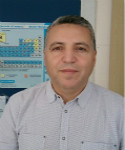
Prof. Baghdad OUDDANE
Université de Lille, France
Title: Behavior of metal contaminants in aquatic system
Abstract:
Trace metals are considered
as serious pollutants in our natural environment because of their persistence,
toxicity and bioaccumulation effects. Their presence in irregular contents in
waters, sediments, suspended particles and soils could reveal the incidence of
anthropogenic sources. Intensive exploitation by industrial activities in
densely populated areas often results in the introduction of potentially
hazardous levels of metals into aquatic ecosystem because of large amounts of
wastes discharged from neighbouring mines and/or smelters along the banks.
Trace metals tend to be trapped in the aquatic medium and are concentrated in
sediments. Their releases into overlaying waters through sediment resuspension
or by organism degradation, desorption from in-place sediments primes to an
increased bioavailability, and thereby disturb the aquatic ecosystem. The
loading of rivers with toxic metals is now of increasing importance because
these aquatic reservoirs become more and more sources of drinking water. Our
recent studies on anthropogenic metals present in the case of highly populated
and greatly industrialized region of Northern France were focused on some sites
like the Seine, the Deûle and the Lys rivers system. A focus will be done on
mercury contamination in such area; mercury is a toxic element, widely
distributed in the environment and is present in the aquatic systems. It exists
in a different chemical species with a wide range of properties and its
toxicological and ecotoxicological effect are strongly dependent on the
chemical form present. Inorganic mercury Hg (II) is the main form of Hg in
waters and sediment samples, which can be naturally converted to much more
toxic form methylmercury (MeHg) by bacterial activity (SBR). MeHg is
accumulated by aquatic organisms and is known to be bio amplified along the
food chain, and poses a threat to humans consuming fish. Knowledge of the
concentration, transport and speciation of this compound in aquatic ecosystems
is needed to predict the potential impact on human and aquatic life. Functionality and the
relationship between metal and biogeochemical parameters will be presented and
discussed. Various factors control the transformation of mercury species. Dissolved organic carbon, sulphate, sulphides,
pH, temperature, microorganisms are all dependent factors ruling mercury
methylation. Methylmercury degradation is photochemically induced in which this
mechanism of degradation is mostly dominant at surface waters. Sulphides, organic matter, fine/coarse
fraction, Fe/Mn oxyhydroxides, mercury partition coefficient between aqueous
and solid phases and resuspension activities mainly control mercury mobility. Recent developments in Hg isotopic tracers
have provided new experimental tools to measure the reactivity and dynamics of
mercury including different transformations (methylation, demethylation,
reduction…). Thus, different mechanisms of mercury biogeochemical cycle and
rates of Hg transformation can identified. This allows better understanding of
the predominating factors regulating mercury transformation and mobility.
Biography:
Baghdad OUDDANE is Full Professor of
Environmental and Water Chemistry in University of Lille (France), he has obtained his PhD in 1990 at University
of Lille. Lecturer (1992-2003) and Full Professor at University of Lille since
2003. He is responsible of "Water Sciences" Master in University of Lille.
His research activity covers a broad
spectrum of environmental studies, speciation of trace metals in natural waters
and sediments, biogeochemical processes in aquatic environments (rivers, canals
and coastal areas) and water treatment. He has supervised more than 30 PhD students
in Water Chemistry, Analytical Chemistry and Water treatment. He has published
153 publications in international journals and more than 180 communications in
national and international conferences, co-authors of four books chapter “(two
popular science)” with a total citation greater than 2450 (author h-index 29
and RG Score 38.62) . He is evaluator of research project at the French
Research Funding Agency (ANR), participation in several thesis committees as
examiner or president in French and foreign universities. He is Associate
Editor in « Euro-Mediterranean Journal for Environmental Integration » Topic 3.
Water Quality (Assessment, Protection & Management) (Editor: Springer) and Associate
Editor “Ciencias Marinas” Journal edited by the Universidad Autónoma de Baja
California (Mexico). He is Member of editorial comity of « Advances in
Chemistry » (Editor : Hindawi Publishing Corp.) and occasional referee for several
international environmental journals (Chemosphere, Environmental Science &
Technology, Environmental Pollution, Environment International, Water Research,…).
He has organized several seminars and International Conference in the field of Water
Chemistry and Water Treatment.